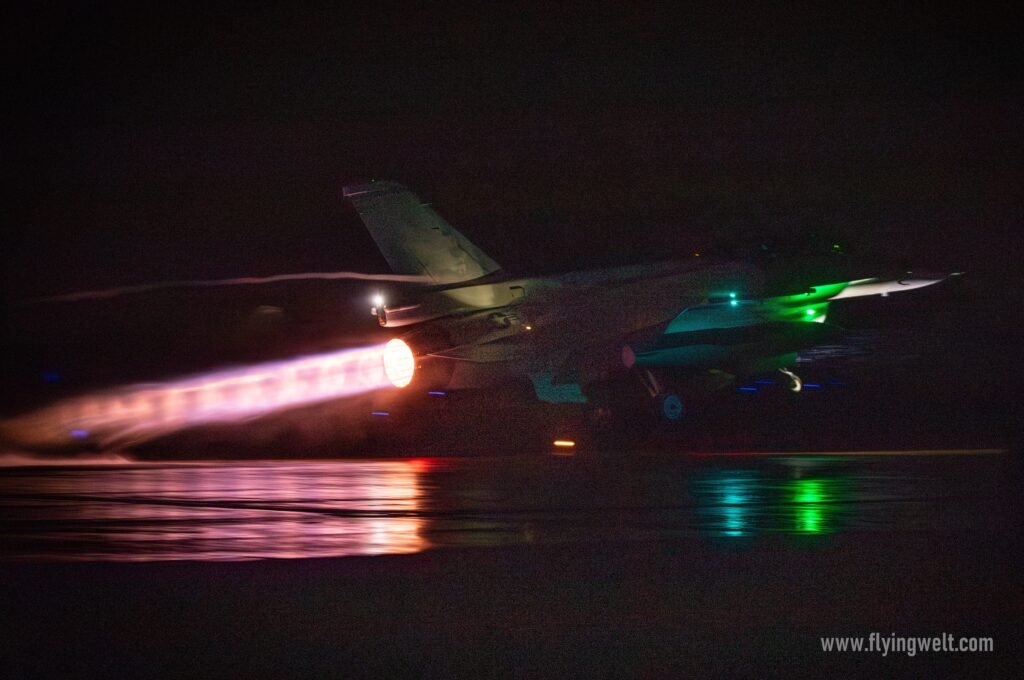Lockheed Martin has reached a significant milestone in aerospace history with the departure of the first ferry cell of three F-16 Block 70 jets from Greenville, South Carolina, to Bahrain. This momentous occasion not only marks Bahrain’s pioneering role as the first Gulf Cooperation Council member to operate the F-16 but also signifies its position as the first to integrate the F-16 Block 70 variant into its formidable fleet.
The journey towards this achievement has been years in the making. Lockheed Martin, a global leader in aerospace technology, has spearheaded the production of five F-16 Block 70 jets for Bahrain, with an additional 11 undergoing various stages of production and testing. Currently, the initial aircraft are undergoing rigorous flight test missions at Edwards Air Force Base, California, under the auspices of the 416th Flight Test Squadron.

OJ Sanchez, vice president and general manager of the Integrated Fighter Group at Lockheed Martin, underscored the strategic importance of the F-16 Block 70 in modern defense landscapes. “With the introduction of the F-16 Block 70, we are witnessing a significant leap in fighter capabilities,” remarked Sanchez. “The integration of this proven platform will empower the Royal Bahraini Air Force to safeguard its skies effectively and collaborate with allies worldwide.”
Sanchez further highlighted the extensive global presence of the F-16, with over 3,100 operational aircraft spanning 25 countries. This extensive deployment underscores the F-16’s reputation as a reliable and versatile fighter, capable of meeting diverse mission requirements with unparalleled performance and efficiency.
The F-16 Block 70 jets epitomize cutting-edge 4.5-generation technology, incorporating state-of-the-art features to enhance operational effectiveness. Equipped with the APG-83 AESA Radar, advanced avionics, and a modernized cockpit housing new safety systems and sophisticated weapon platforms, these aircraft represent the pinnacle of airborne superiority. Moreover, enhancements such as conformal fuel tanks for extended range, an upgraded performance engine, and an industry-leading extended structural service life of 12,000 hours further underscore the F-16 Block 70’s unmatched capabilities.
Of paramount importance is the integration of safety features like the Automatic Ground Collision Avoidance System (Auto GCAS), a critical component that has proven instrumental in averting accidents and saving lives. Introduced in late 2014, Auto GCAS has safeguarded pilots across 12 jets, demonstrating the aircraft’s unparalleled safety and performance standards.
Lockheed Martin’s enduring commitment to the Middle East, spanning over five decades, underscores its dedication to regional security and technological innovation. With a current backlog of 133 aircraft for six countries, the F-16 Block 70 program continues to garner international acclaim. Leveraging advanced manufacturing and digital technologies, Lockheed Martin anticipates delivering 19-21 jets this year, with potential opportunities for up to 300 additional jets worldwide.
In conclusion, Bahrain’s acquisition of the F-16 Block 70 represents a watershed moment in aerospace history, ushering in a new era of security and collaboration in the Gulf region. As Lockheed Martin continues to push the boundaries of innovation, the F-16 Block 70 stands as a testament to the company’s unwavering commitment to excellence and its mission to unlock the skies for future generations.
